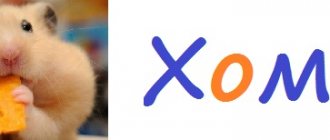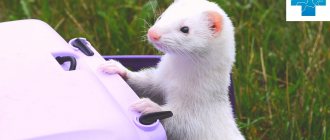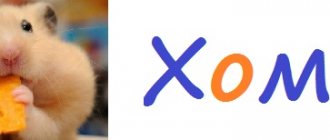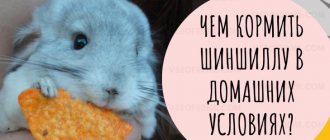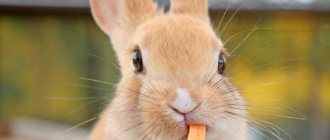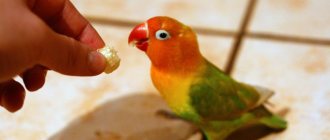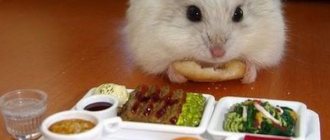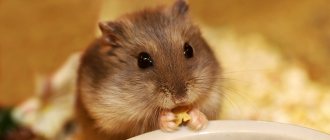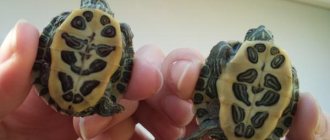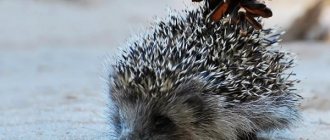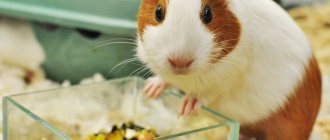Ferrets began to be domesticated 2000 years ago, but only in the last 30-35 years have they become so common in houses and apartments as pets. Before getting such a restless animal, you should learn how to care for ferrets (ferrets), what to feed them and how to provide living conditions as close as possible to their natural habitat.
general characteristics
Despite its small size, the ferret is a fast, agile animal that can easily catch a nimble lizard, mouse or other small rodents. In times of hunger, ferrets can feast on larger prey: chickens, geese, muskrats or hares. In winter, when other animals try to sit in burrows, ferrets have the most unfavorable time for hunting, and they can feed on carrion.
Based on preferences, it is not difficult to feed your ferret at home. Food should be predominantly of animal origin.
The structure of the daily diet should include:
- from 50% animal protein;
- up to 25% fat;
- about 20% carbohydrates;
- 2-3% food of plant origin.
The main thing for a ferret is meat, fish, and offal. In addition to food of animal origin, there are a number of other products that are useful for ferrets, but there are also prohibited, hazardous to health, which should not be fed to a domestic ferret under any circumstances.
Vitamins and supplements
As already noted, vitamins and supplements should only be included in a ferret’s diet if the animal is on a home-cooked diet.
An overdose of any vitamin or microelement can harm your pet's health.
The choice of supplements and vitamin complexes for domesticated predators today is quite extensive. Here are the most popular ones:
- "Vita-Sol"
This comprehensive vitamin supplement contains 7 vitamins and 4 types of fatty amino acids. The manufacturer recommends using the supplement during periods of growing up, pregnancy and lactation, as well as during molting of the animal. Directions for use and doses are indicated on the packaging. The duration of the course is 1 month.
- "FerretVite"
FerretVite paste will help your pet gain weight and improve appetite.
This is a special balanced paste that contains minerals, vitamins and easily digestible fats. This product is designed to support ferrets during postoperative periods, and also helps sick and exhausted animals recover.
Eating paste increases the animal's appetite and weight gain, so it is not recommended to give treats to overweight pets. The feeding schedule is indicated on the packaging.
Ferrets are strictly prohibited from taking vitamins intended for humans. Taking such drugs causes illness and death in pets.
- Vitamins of groups A, D and E.
Vitamins of these groups are given mainly to females during periods of estrus, pregnancy and lactation, as well as one-month-old ferrets in order to prevent bone diseases. The dosage should be observed very strictly, adhering to the factory instructions or the veterinarian's prescriptions.
Healthy foods
Ferrets are quite demanding, and for harmonious development, meat products in their diet should be about 50-60%. In addition to high-protein foods, cereals are served.
You can feed your ferret the following types of meat:
- chicken;
- turkey;
- beef;
- lamb;
- rabbit meat;
- horse meat;
- quail
The most suitable are lean meats. A more budget-friendly food option suitable for ferrets is giblets, offal - liver, kidneys, heart.
Ferrets are not averse to eating fish. Of the most preferred types:
- salmon;
- horse mackerel;
- herring;
- mackerel;
- cod;
- flounder.
Crustaceans such as shrimp, as well as squid, will also appeal to your pet.
Porridge is given in the form of a mixture of cereals: buckwheat, wheat, rice, pearl barley or other types preferred by the pet.
Ferrets' favorite foods are those that they can independently obtain in the wild. These include:
- mealworms, zofobas (only as additional food, since they are very fatty);
- cockroaches (Argentine, Turkmen);
- chickens;
- mice.
This food can be purchased at a veterinary pharmacy or pet store, or at a specialized market.
Dairy products also benefit ferrets; they readily eat cottage cheese, kefir, and cheese.
Despite the small amount of fiber in the diet, vegetables and fruits are necessary to normalize digestion. Ferrets love:
- vegetables - pumpkin, peppers, radishes, zucchini, broccoli, tomatoes, peppers;
- fruits and berries - bananas, persimmons, avocados, pears, apples, gooseberries, melons, strawberries, cherries, grapes.
In the winter season, as a replacement for fresh fruit, you can give your pet dried fruits - prunes, dried apricots, figs, raisins, dates.
Many useful substances are contained in fresh herbs, so you can add chopped dill and parsley to the nutritional mixture. In summer, ferrets benefit from nettle leaves and stems, previously scalded with boiling water.
When deciding what to feed your ferret at home, you need to consider the list of prohibited foods. It contains hard, difficult to digest vegetables.
Also, you should not offer ferrets excessively fatty foods, smoked foods, spicy foods and seasonings, pickles, baked goods, foods high in sugar, nuts, and soy.
It is enough for a male ferret to eat up to 400 g of food per day. Females need a little less - up to 200 g of food.
Knowing the list of permitted products, it will not be difficult to feed your ferret at home.
What is dangerous to feed?
Not only plant foods in large quantities are harmful to these pets. Many components we are familiar with pose a danger to ferrets.
| Dangerous and harmful foods for ferrets | |
| Type of feed: | Cause: |
| pork | possibility of infection with Aujeszky's disease, used only in boiled form |
| chicken by-products | When raising poultry, hormonal drugs and antibiotics are used, which accumulate in the internal organs |
| raw fish | the presence of parasites, such as diphyllobothrium, can only be used after freezing |
| boiled bones, boiled meat with bones | cooked bones are not digested, but are destroyed in the intestines into sand, causing coprostasis |
| sour milk | Causes stomach upset in ferrets |
| Rye flour | may cause intestinal dysfunction |
| sugar, sweets | insulinoma, gastroenteritis |
| dog food | high content of plant components in any class |
Homemade ferret food
The advantage of self-prepared food is the ability to select the necessary products.
Feeding puppies
Adult food can be given to puppies only from the age of 3-4 weeks. Until this time, they feed on mother's milk. The transition to adult food is carried out gradually. A small amount of minced meat is mixed with milk, kefir and little by little is given to the kids. Deprived of valuable mother's milk, puppies lose vitamins, their immunity is weakened, and digestion worsens, so they need to be given vitamin D and probiotics to improve the absorption of foods.
A small ferret should be fed the following dish:
- Prepare cereals, preferably rice or buckwheat. They do not have a dense shell and are easily digested. The cereal must be ground until it becomes flour, and then boiled to the consistency of thick jelly.
- The main ingredients for minced meat are chicken necks and stomachs. They need to be ground.
- Mix the prepared products and give them to the puppies. For 3 kg of minced meat there are 400 g of raw cereal.
Adult ferret food recipe
For pets over 1 year of age, it is necessary to diversify the diet as much as possible, expanding the range of products in the mixture. To prepare 1 kg of feed you will need:
- meat (chicken, beef, lamb) - up to 0.5 kg;
- beef heart - 100 g;
- fish - 200 g;
- cottage cheese - 100 g;
- rice - 100g;
- a little animal fat (about 15 g).
Rice porridge must be boiled until tender and thoroughly chopped. Grind meat products and fish into minced meat, and then mix everything.
Features of feeding
Even with the best food for ferrets, health problems may arise:
- Vomit. Often the reason lies in the need to regurgitate the fur. A similar thing is observed in cats, which cleanse their stomach in this way. With hormonal changes during pregnancy, ferrets actively lick their fur and experience itching. Hairballs should come out, and if this does not happen, you should give your pets special hair removal pastes.
- Lack of vitamins and minerals. The deficiency is observed during the female's pregnancy - she noticeably loses weight, her fur stops shining, and her teeth deteriorate. Negative changes can be prevented by introducing vitamins A, D, B. The source of calcium for females is cottage cheese, meat and bone meal. A number of valuable vitamins are found in fish oil; it is also useful to give to animals.
It is very important to constantly fill drinking bowls with clean drinking water. Ferrets are given fermented milk drinks 1-2 times a week.
If your pet does not want to eat a new type of food
Ferrets are considered the most finicky animals in their diet. In order not to experience difficulties with this, it is recommended that from the very first day the animal be offered a varied diet, or rather different foods. This way he will have a choice. You can also mix different dry foods in one bowl.
Some owners feed their animals chicken baby food for variety, and can also pour duck or chicken broth into the food separately. If the pet gets used to the broth, then it will be possible to transfer it to new types of food without any problems. All you need to do is simply add broth to your diet.
Share
Feeding standards
Underfeeding, like overfeeding a pet, has a negative impact on health, so you need to find out how many times a day to feed your ferret.
When determining the diet, the age of the animal should be taken into account. Ferrets have an excellent metabolism, they are active, mobile, expend a lot of energy, and during intensive growth they more often need food than adults.
You need to feed your ferret:
- up to 1 month - 4-5 times a day;
- young animals - up to 4 times a day;
- for adult ferrets - at least 2 times a day.
There are no clear guidelines regarding animal feeding standards. Ferrets have a good metabolism, but their gastric tract is half the size of a cat's, meaning they only eat a small amount of food at a time. It is also worth considering that the animal’s body is not adapted to digest plant foods, so there should be a minimum amount of it in the diet.
To properly feed your ferret, you need to pay attention to the composition of ready-made food from pet store shelves.
Main requirements for the diet
Ferrets are like cats; they also love to eat meat. But their main difference from cats or dogs is that they have a rather primitive digestive system. There are quite a few bacteria in their intestinal tract that can digest large amounts of food at once, as well as carbohydrates in particular. Just meat for such pets can be considered a single normal diet, which is as close as possible to the natural diet and nutrition in general. But meat is only part of their diet. Ferrets also feed on internal organs, for example, liver or kidneys, and can even eat the intestines of the victim. The ferret will not disdain skin or bones. Their teeth allow them to eat such food. But you can’t limit yourself to meat only, because this affects the health of your pet. Therefore, food should also be included in the diet.
Ready-made food for ferrets
If the level of employment is high and it is impossible to independently prepare the necessary feed mixture, you can go to any pet store and purchase ready-made food, but which one is best for your ferret is something you have to figure out. It can be economy or premium, dry or wet.
Dry food
The best dry foods for ferrets are in the super premium category. This mark means that it contains no preservatives, only natural products are used, and the composition contains the maximum amount of products containing animal protein.
In addition to super premium, you can find premium and economy food. It is advisable to purchase the latter in rare cases. If it is impossible to buy expensive balanced feeds, it is better to prepare the mixture yourself.
There are general recommendations for feeding your ferret dry food:
- Of all the ingredients, the largest volume should be poultry, cattle or cold cuts.
- Plant fibers can be no more than 5%.
- Corn is a nutritional component, but it should not be in the feed. A low percentage of corn flour content is acceptable, but if corn is included as the main component, the animal should not eat such feed.
- The composition must contain additives - amino acids, vitamins, mineral components.
- It is necessary to pay attention to the percentage of ash content, since exceeding the norm can cause urolithiasis. The permissible limit is up to 7%.
The most popular feeds are:
- Bosch Tiernahrung GmbH & Co Bosch, Germany. The line includes dry mixtures for puppies, ferrets over 1 year old, and for older animals over 5 years old. The composition is balanced, and the food itself belongs to the premium and super-premium class. Bosch Totally Ferret Active High Premium contains 36% protein from poultry, 22% fat and only 1.5% fiber.
- Frettchen4you, Germany. The manufacturer offers super premium food with a high protein content. The composition is completely balanced. Frettchen4You Revolution food is hypoallergenic and contains up to 48% protein. The main source of nutrients is assorted fresh turkey meat (from 21%), duck (from 6%), fish (from 6%), rabbit (from 5%), as well as powder mixtures. Under the Frettchen4you brand you can purchase high-protein food with minimal carbohydrate content, as well as complete feed mixtures for every day.
- Padovan Ferret Food, Italy. Despite imported production, this food is one of the least preferred, but widespread due to its low price. Its disadvantage is the presence of cereals, oils, and fats. Plant foods, offal, and a low percentage of meat are used as a source of protein.
Excess fats and carbohydrates in food can lead to a number of diseases in your pet - gastritis, pancreatitis, insulinoma, hypovitaminosis and many others.
High-quality feed completely covers the animal’s need for vitamins, minerals, proteins, fats, carbohydrates, and has a positive effect on development and the immune system.
Wet food
Wet foods are ideal for your ferret's delicate digestive system. They are quickly absorbed and promote better intestinal motility.
The most popular canned foods include:
- Vitakraft FERRET Menu. It contains meat, meat by-products (15%), fish and fish by-products (10%), minerals (10%). Crude fiber contains only 0.2%, and ash - 2%. This food will definitely not cause any difficulties with digestion and is optimal for ferrets of any age.
- Four-legged gourmet Golden line - wet food for ferrets is a super premium food, and the quality of the ingredients is included in the Human grade category, that is, suitable for humans. The main composition is chicken meat, beef, chicken fat, jelly, rice, taurine, brewer's yeast, fish oil, seaweed, water. The food is perfectly balanced and healthy.
- Night hunter, assorted. This food can be given on rare occasions. It contains little meat (from 10%), and the bulk consists of cereals and offal. Such canned food does not contain enough protein for the ferret, and such agile predators need meat.
If you have run out of ferret food at home, but have a cat, you can feed the ferret cat food, but provided that this food is premium or super premium. Cheap cat food is low in meat and high in fiber, but cats and ferrets have very different digestive systems, so what's good for a cat isn't good for a ferret. The best option is to look through the list of products from which you can prepare food for your ferret yourself, make a nutritional mixture and give it to your pet in portions.
Dry food storage
An important factor is the storage of dry food. You should always keep track of the production date and expiration date of the food. It is important not to give your pet types of food that have already expired.
Once the packaging is unsealed, the product will need to be stored for no more than 3 months. If you have one pet, it is better not to buy large packages, but to use small or medium-sized bags for feeding. You will also need to monitor and store the food in a dry place, since moisture is not allowed to enter it. Moisture is an excellent environment for the development of fungus and malignant bacteria. All this can poison the animal.
It is recommended to protect the animal and, after opening the package, pour the food into a jar with an airtight lid.
Today, we can highlight the best food composition for ferrets. These include Totally Ferret and EVO Dry Ferret Food. But if there are none, then animal owners can use other recommended foods as a diet. The table below will allow you to familiarize yourself with the composition and name of the feed:
The table presented makes it possible to understand as clearly as possible which food is best for a ferret.
